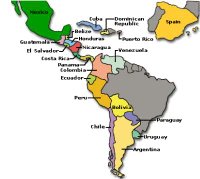Published Saturday, October 28, 2006
 Spanish is the Romance language that is the official language of Spain and many Central and South American countries including countries colonized by Spain. The United States has a significant portion of its population speaking Spanish which, are mostly Spanish-speaking immigrants. Though English is the national language of the United States, the Unitred State does not have an official language. You might no doubt know about some Spanish speaking countries culture, religion and food but , do you know the countries where Spanish is mostly spoken? Here is a list of Spanish Speaking Countries that show where Spanish is spoken by a significant portion of the population or where it is the official language of that country. Spanish is the Romance language that is the official language of Spain and many Central and South American countries including countries colonized by Spain. The United States has a significant portion of its population speaking Spanish which, are mostly Spanish-speaking immigrants. Though English is the national language of the United States, the Unitred State does not have an official language. You might no doubt know about some Spanish speaking countries culture, religion and food but , do you know the countries where Spanish is mostly spoken? Here is a list of Spanish Speaking Countries that show where Spanish is spoken by a significant portion of the population or where it is the official language of that country.
Countries Where Spanish Is Mostly Spoken
Argentina Bolivia Chile Colombia Costa Rica Cuba Dominican Republic Ecuador El Salvador Equatorial Guinea Guatemala Honduras Mexico Nicaragua Panama Paraguay Peru Puerto Rico Spain United States of America Uruguay Venezuela
Related Aricles:Mottos for countries around the worldLanguages by CountriesState Mottos: The Mottos of All Fifty US StatesNicknames of America 50 StatesSmallest country in the world
Published Saturday, October 21, 2006
 A proverb is defined as a short pithy saying in frequent and widespread use that expresses a basic truth or practical precept. In other words, it is a brief popular epigram or maxim. Most of us all regard proverbs as words of wisdom A proverb is defined as a short pithy saying in frequent and widespread use that expresses a basic truth or practical precept. In other words, it is a brief popular epigram or maxim. Most of us all regard proverbs as words of wisdom and as such, they are sometimes used to make important decisions in our lives. Here are some proverbs that will definitely let you ponder. So, if the proverbs listed below are conflicting advice, what should you do? Apply them to your own situation in your life with common sense. and as such, they are sometimes used to make important decisions in our lives. Here are some proverbs that will definitely let you ponder. So, if the proverbs listed below are conflicting advice, what should you do? Apply them to your own situation in your life with common sense.
Absence makes the heart grow fonder.
- but -
Out of sight, out of mind.
Actions speak louder than words.
- but -
The pen is mightier than the sword.
A silent man is a wise one.
- but -
A man without words is a man without thoughts.
Look before you leap.
- but -
He who hesitates is lost.
Many hands make light work.
- but -
Too many cooks spoil the broth.
Beware of Greeks bearing gifts.
- but -
Don't look a gift horse in the mouth.
Clothes make the man.
- but -
Don't judge a book by its cover.
Nothing ventured, nothing gained.
- but -
Better safe than sorry.
The bigger, the better.
- but -
The best things come in small packages.
What will be, will be.
- but -
Life is what you make it.
Cross your bridges when you come to them.
- but -
Forewarned is forearmed.
What's good for the goose is good for the gander.
- but -
One man's meat is another man's poison.
With age comes wisdom.
- but -
Out of the mouths of babes and sucklings come all wise sayings.
The more, the merrier.
- but -
Two's company; three's a crowd
It's the squeaky wheel that gets the grease.
- but -
The nail that sticks out gets hammered.
The best things in life are free.
- but -
You get what you pay for.
It never rains, than it pours.
- but -
Lightning never strikes twice in the same place.
Everything comes to him who waits.
- but -
He who hesitates is lost.
Opposites attract.
- but -
Birds of a feather flock together.
Never too old to learn.
- but -
You can't teach an old dog new tricks.
There is nothing permanent except change.
- but -
There is nothing new under the sun.
Variety is the spice of life.
- but -
Don't change horses in the middle of a stream.
Never do evil, that good may come of it.
- but -
The end justifies the means.
Better to ask the way than to go astray.
- but -
Ask no questions and hear no lies.
Practice makes a man perfect.
- but -
All work and no play makes Jack a dull boy.
Related Articles:
Oxymoron: Expression with Contradictory Words
Anagram: A Short List of Popular Anagrams and Its Definition
The Use and Meaning of Internet Slang: Abbreviations and Acronyms
Emoticons and Smileys - Their Functions and Meanings
English Idioms - English phrases and their meanings
Latin Abbreviations and their English meaning
How to say I Love You in different languages
How to say Happy New Year in different languages
How to say Merry Christmas in Different Languages
Differences between American and British English - PT. 2
Differences between American and British English - PT. 1
Published Saturday, October 14, 2006
 A Collective noun is a noun (a word or term) that is singular in form but is used to define (refer) a group of people, animals, objects or concepts. Thus, it is a noun representing a group as a unit. So what is the difference between a reptile and an amphibian? Reptiles are any air-breathing cold-blooded (uses the heat of the sun to keep its blood warm) egg-laying vertebrate with an outer covering of scales or plates and a bony skeleton which, crawls or moves on its belly. On the other hand, an amphibians are cold-blooded vertebrate that spend some time on land but must breed and develop into an adult in water. In other words , they are a cold-blooded animal with an aquatic larval stage and a terrestrial adult stage where the aquatic larvae undergo metamorphosis into adult form. Thus, they are an intermediate form between fishes and reptiles (e.g. frogs & toads). Below you will find a short list for the collective nouns for reptiles and amphibians. A Collective noun is a noun (a word or term) that is singular in form but is used to define (refer) a group of people, animals, objects or concepts. Thus, it is a noun representing a group as a unit. So what is the difference between a reptile and an amphibian? Reptiles are any air-breathing cold-blooded (uses the heat of the sun to keep its blood warm) egg-laying vertebrate with an outer covering of scales or plates and a bony skeleton which, crawls or moves on its belly. On the other hand, an amphibians are cold-blooded vertebrate that spend some time on land but must breed and develop into an adult in water. In other words , they are a cold-blooded animal with an aquatic larval stage and a terrestrial adult stage where the aquatic larvae undergo metamorphosis into adult form. Thus, they are an intermediate form between fishes and reptiles (e.g. frogs & toads). Below you will find a short list for the collective nouns for reptiles and amphibians.
Axolotls: A harem of axolotls
Cobras: A quiver of cobras
Crocodiles: A bask of crocodiles (congregation, float, nest)
Dinosaurs: A herd of dinosaurs (pack)
Dragons: A flight of dragons (weyr, wing)
Frogs: An army of frogs (colony, knot)
Iguanas: A mess of iguanas
Monitors: A bank of monitors
Rattlesnakes: A rhumba of rattlesnakes
Snakes: A den of snakes (bed, knot, nest, pit, slither)
Toads: A knot of toads (knob, nest)
Turtles: A bale of turtles (dule, nest, turn)
Vipers: A nest of vipers (generation)
Related Articles:
Collective Nouns for Fish - What Group of Fish are Called
Collective Nouns for Objects and Concepts
Collective Nouns for Birds - What Group Of Birds Are Called
Collective Nouns of People
What Group Of Animals Are Called
Published Saturday, October 07, 2006
 Before blogs were what they are today, they existed in a total different format called online diary. Online diary which came about in 1995, was really a personal diary where individuals would keep an account of their everyday personal lives. This would include stuff such as; daily observations, thoughts, appointments, planned activities, views, moods, poems etc. These online daries were maintained through the internet using a personal website or a one that was provided by a diary hosting company. As the popularity of online diarists increased they became know as online journals. However, as diarists began to combine their sites with links which led to the term "weblog" or "web log". The term "weblog" was coined by Jorn Barger in 1997. Before blogs were what they are today, they existed in a total different format called online diary. Online diary which came about in 1995, was really a personal diary where individuals would keep an account of their everyday personal lives. This would include stuff such as; daily observations, thoughts, appointments, planned activities, views, moods, poems etc. These online daries were maintained through the internet using a personal website or a one that was provided by a diary hosting company. As the popularity of online diarists increased they became know as online journals. However, as diarists began to combine their sites with links which led to the term "weblog" or "web log". The term "weblog" was coined by Jorn Barger in 1997.
 The term "web log" or "weblog" was short lived and was changed in 1999 by Peter Merholz (at peterme.com) who coined the term "blog" which it is called to this day. As blogs gained momentum as it expanded in numbers. Blogs became a social community and the introduction of automated publishing software (blogging software) now became reality. The evolution of blog software systems to process larger data was now a necessity. It simplified the publishing process for thousands of users (publishers ) who were technically illiterate. In August 1999 Blogger.com The term "web log" or "weblog" was short lived and was changed in 1999 by Peter Merholz (at peterme.com) who coined the term "blog" which it is called to this day. As blogs gained momentum as it expanded in numbers. Blogs became a social community and the introduction of automated publishing software (blogging software) now became reality. The evolution of blog software systems to process larger data was now a necessity. It simplified the publishing process for thousands of users (publishers ) who were technically illiterate. In August 1999 Blogger.com was created by Pyra lab. Pyra Labs, the company who coined the word “Blogger” now played an important and pivoting role, thus setting the stage for where the blogging system is today. Blogger a blog publishing system, offered the option of installing blogs on their own server Blogspot or a server of ones' own choosing which is transferred via FTP or SFTP. This made it quite simple for thousands of publishers (bloggers) and automated the blogging process, thus , accelerating the publishing process. was created by Pyra lab. Pyra Labs, the company who coined the word “Blogger” now played an important and pivoting role, thus setting the stage for where the blogging system is today. Blogger a blog publishing system, offered the option of installing blogs on their own server Blogspot or a server of ones' own choosing which is transferred via FTP or SFTP. This made it quite simple for thousands of publishers (bloggers) and automated the blogging process, thus , accelerating the publishing process.
 However, in February 2003, search engine giant Google purchased Pyra lab. Pyra lab originally charged its bloggers at blogger.com a fee, for those who had the premium features but Google, after acquiring the blog company offered this service totally free of charge. In addittion, it provided bloggers witn an avenue through which they could earn a revenue, by placing affiliates contextually-relevant paid ads However, in February 2003, search engine giant Google purchased Pyra lab. Pyra lab originally charged its bloggers at blogger.com a fee, for those who had the premium features but Google, after acquiring the blog company offered this service totally free of charge. In addittion, it provided bloggers witn an avenue through which they could earn a revenue, by placing affiliates contextually-relevant paid ads (adsense) on their site if they choose to do so. Blogs expanded drastically, since blogs were now into the mainstream with millions of new blogs joining the blogosphere each year. Blogs are now being used by lawyers, businesses, doctors, teachers, writers, media companies, students, ministers and the list goes on. Google even upgraded the blog software system with lots of additional features such as new blog templates, image hosting in post, posts by E-Mail and lately, topic category just to name a few. (adsense) on their site if they choose to do so. Blogs expanded drastically, since blogs were now into the mainstream with millions of new blogs joining the blogosphere each year. Blogs are now being used by lawyers, businesses, doctors, teachers, writers, media companies, students, ministers and the list goes on. Google even upgraded the blog software system with lots of additional features such as new blog templates, image hosting in post, posts by E-Mail and lately, topic category just to name a few.
Related Article:
The Definition and Purpose of a Blog: What is a Blog?Labels: Internet
|
|
Message Board
FeedBack Appreciated
Please spare some time to give your feedback about this site. Thanks in advance.
|
|
|
|
Message from the Author
 R. Edmondson
United States
R. Edmondson
United States
Did You Know site is used as a learning tool to provide a stimulating learning environment for general knowledge development; to promote increased diversity on the online learning community and to incorporate the site’s informative quality content with the best of online communication platform (blog) in making knowledge accessible and free to all.
Thanks for the support.
|
|
|
|
|
 Spanish is the Romance language that is the official language of Spain and many Central and South American countries including countries colonized by Spain. The United States has a significant portion of its population speaking Spanish which, are mostly Spanish-speaking immigrants. Though English is the national language of the United States, the Unitred State does not have an official language. You might no doubt know about some Spanish speaking countries culture, religion and food but , do you know the countries where Spanish is mostly spoken? Here is a list of Spanish Speaking Countries that show where Spanish is spoken by a significant portion of the population or where it is the official language of that country.
Spanish is the Romance language that is the official language of Spain and many Central and South American countries including countries colonized by Spain. The United States has a significant portion of its population speaking Spanish which, are mostly Spanish-speaking immigrants. Though English is the national language of the United States, the Unitred State does not have an official language. You might no doubt know about some Spanish speaking countries culture, religion and food but , do you know the countries where Spanish is mostly spoken? Here is a list of Spanish Speaking Countries that show where Spanish is spoken by a significant portion of the population or where it is the official language of that country.










 R. Edmondson
United States
R. Edmondson
United States













































